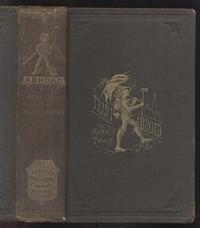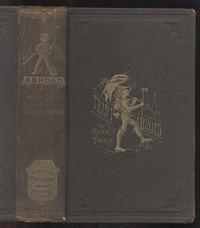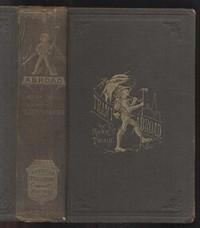Read this ebook for free! No credit card needed, absolutely nothing to pay.
Words: 25757 in 11 pages
This is an ebook sharing website. You can read the uploaded ebooks for free here. No credit cards needed, nothing to pay. If you want to own a digital copy of the ebook, or want to read offline with your favorite ebook-reader, then you can choose to buy and download the ebook.


: A Tramp Abroad — Volume 04 by Twain Mark - Humorous stories; Europe Fiction; Americans Europe Fiction; Walking Fiction
From Baden-Baden we made the customary trip into the Black Forest. We were on foot most of the time. One cannot describe those noble woods, nor the feeling with which they inspire him. A feature of the feeling, however, is a deep sense of contentment; another feature of it is a buoyant, boyish gladness; and a third and very conspicuous feature of it is one's sense of the remoteness of the work-day world and his entire emancipation from it and its affairs.
Those woods stretch unbroken over a vast region; and everywhere they are such dense woods, and so still, and so piney and fragrant. The stems of the trees are trim and straight, and in many places all the ground is hidden for miles under a thick cushion of moss of a vivid green color, with not a decayed or ragged spot in its surface, and not a fallen leaf or twig to mar its immaculate tidiness. A rich cathedral gloom pervades the pillared aisles; so the stray flecks of sunlight that strike a trunk here and a bough yonder are strongly accented, and when they strike the moss they fairly seem to burn. But the weirdest effect, and the most enchanting is that produced by the diffused light of the low afternoon sun; no single ray is able to pierce its way in, then, but the diffused light takes color from moss and foliage, and pervades the place like a faint, green-tinted mist, the theatrical fire of fairyland. The suggestion of mystery and the supernatural which haunts the forest at all times is intensified by this unearthly glow.
We found the Black Forest farmhouses and villages all that the Black Forest stories have pictured them. The first genuine specimen which we came upon was the mansion of a rich farmer and member of the Common Council of the parish or district. He was an important personage in the land and so was his wife also, of course.
His daughter was the "catch" of the region, and she may be already entering into immortality as the heroine of one of Auerbach's novels, for all I know. We shall see, for if he puts her in I shall recognize her by her Black Forest clothes, and her burned complexion, her plump figure, her fat hands, her dull expression, her gentle spirit, her generous feet, her bonnetless head, and the plaited tails of hemp-colored hair hanging down her back.
The house was big enough for a hotel; it was a hundred feet long and fifty wide, and ten feet high, from ground to eaves; but from the eaves to the comb of the mighty roof was as much as forty feet, or maybe even more. This roof was of ancient mud-colored straw thatch a foot thick, and was covered all over, except in a few trifling spots, with a thriving and luxurious growth of green vegetation, mainly moss. The mossless spots were places where repairs had been made by the insertion of bright new masses of yellow straw. The eaves projected far down, like sheltering, hospitable wings. Across the gable that fronted the road, and about ten feet above the ground, ran a narrow porch, with a wooden railing; a row of small windows filled with very small panes looked upon the porch. Above were two or three other little windows, one clear up under the sharp apex of the roof. Before the ground-floor door was a huge pile of manure. The door of the second-story room on the side of the house was open, and occupied by the rear elevation of a cow. Was this probably the drawing-room? All of the front half of the house from the ground up seemed to be occupied by the people, the cows, and the chickens, and all the rear half by draught-animals and hay. But the chief feature, all around this house, was the big heaps of manure.
We became very familiar with the fertilizer in the Forest. We fell unconsciously into the habit of judging of a man's station in life by this outward and eloquent sign. Sometimes we said, "Here is a poor devil, this is manifest." When we saw a stately accumulation, we said, "Here is a banker." When we encountered a country-seat surrounded by an Alpine pomp of manure, we said, "Doubtless a duke lives here."
The importance of this feature has not been properly magnified in the Black Forest stories. Manure is evidently the Black-Forester's main treasure--his coin, his jewel, his pride, his Old Master, his ceramics, his bric-a-brac, his darling, his title to public consideration, envy, veneration, and his first solicitude when he gets ready to make his will. The true Black Forest novel, if it is ever written, will be skeletoned somewhat in this way:
SKELETON FOR A BLACK FOREST NOVEL
Rich old farmer, named Huss.
Has inherited great wealth of manure, and by diligence has added to it. It is double-starred in Baedeker. The Black forest artist paints it--his masterpiece. The king comes to see it. Gretchen Huss, daughter and heiress. Paul Hoch, young neighbor, suitor for Gretchen's hand--ostensibly; he really wants the manure.
Hoch has a good many cart-loads of the Black Forest currency himself, and therefore is a good catch; but he is sordid, mean, and without sentiment, whereas Gretchen is all sentiment and poetry. Hans Schmidt, young neighbor, full of sentiment, full of poetry, loves Gretchen, Gretchen loves him. But he has no manure. Old Huss forbids him in the house. His heart breaks, he goes away to die in the woods, far from the cruel world--for he says, bitterly, "What is man, without manure?"
Paul Hoch comes to old Huss and says, "I am at last as rich as you required--come and view the pile." Old Huss views it and says, "It is sufficient--take her and be happy,"--meaning Gretchen.
Free books android app tbrJar TBR JAR Read Free books online gutenberg
More posts by @FreeBooks

: Annals of a Quiet Neighbourhood by MacDonald George - Country life Fiction; Vicars Parochial England Fiction







